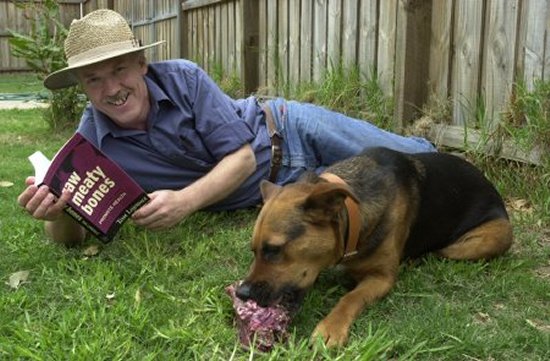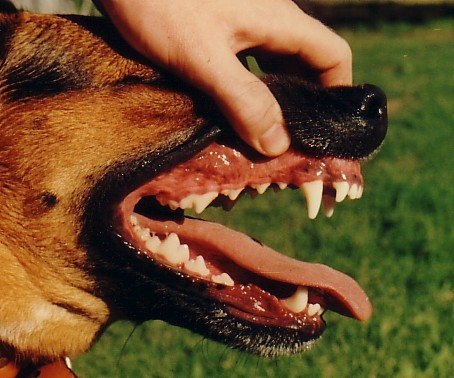
Sydney Vet Tom Lonsdale says raw, meaty bones are essential for your pet's health
(Photo supplied by Hawkesbury Gazette, NSW)

An example of healthy canine teeth
THE WEST AUSTRALIAN ‘TODAY’ MONDAY MARCH 11 2002
Are we
poisoning our pets?
A controversial Sydney vet says we give our cats and dogs the wrong
food. He tells OLGA de MOELLER they should eat raw, meaty bones.
Cats and dogs are finicky customers, it seems. Cast an eye down the
supermarket pet food aisle and it seems hard to imagine our four-footed friends
could stomach anything other than tender slices of turkey, succulent flaked
tuna and gourmet beef.
Not so, says Sydney vet Tom Lonsdale, who is due to visit Perth this
month. He says that carnivores, which evolved on a diet of whole carcasses,
fare badly on canned and dry foods.
Instead, he says, cats and dogs should eat predominantly raw, meaty
bones – the title of his book. This took five years to complete and caused so
much fur to fly that he says he sold his veterinary practice in 1997 to ease
the load.
Dr Lonsdale, a graduate of the Royal Veterinary College at the
University of London, claims pet food diets based on processed meat and cereal
are making animals sick by causing dental disease, which can lead to a range of
debilitating and often fatal conditions, such as kidney failure and cancer.
He has infuriated his profession, which, he says, acknowledges the
severity of oral disease in pets and is making big profits out of animal
dentistry by using treatments that should be unnecessary.
“Modern processed diets are known to be responsible for periodontal or
gum disease, which affects more than 85 per cent of domestic cats and dogs over
three years of age,” he said.
“Slurping canned food does not scrub, clean and polish the teeth, which
is what happens when a dog eats a raw, meaty bone.
If bacteria are not cleaned away, they set up major smelly infections,
which rot the gums and dissolve the living jaw bone. Ultimately, the teeth can
fall out. Bad breath is often the first sign that something is wrong.”
Take foul-mouth AIDS, a form of acquired immune deficiency syndrome
described by Dr Lonsdale in 1996.
He attributed the condition to dietary factors and toxins circulating
in the blood from dental disease, which depressed the immune system and could
lead to skin rashes and lethargy, not to mention more serious heart, liver and
kidney problems.
Dr Lonsdale argued that treating the rotting mouth and providing pets
with a natural diet allowed the immune system to recover and gave animals a new
lease of life.
Even a 12-year-old terrier with few teeth, mammary cancer, a heart
condition and liver problems bounced back and gained weight on a diet of raw
chicken wings.
Dr Lonsdale stressed that foul-mouth AIDS was not contagious and was
not caused by a virus like HIV or the feline immunodeficiency virus (FIV).
“The veterinary establishment engaged a Queensland University professor
to refute the AIDS claim, which I stand by and which the community urgently
needs to be informed of,” he said.
Dr Lonsdale said that processed foods were full of additives, such as
colouring agents and preservatives, and most contained cereal grains, which
were not a natural part of a carnivore’s diet and could lead to a range of
health problems.
“The primary ingredients in these foods are unsuitable for carnivores,”
he said. “The cooking process changes the composition of fats and proteins, the
vitamins often get destroyed and the mineral balance is a hit-and-miss affair.
“Fed on a daily basis, these foods are bound to have an adverse effect
on a pet.”
Dr Lonsdale said a domestic dog’s diet should be 70 per cent raw meaty
bones, plus table scraps to provide other nutrients. Cats should have at least
80 per cent raw, meaty bones.
“Try to fit the size of the raw meat bones to the size of the animal,”
he said. “Cats and small dogs could have whole fish, chicken wings, necks,
quail and rabbit.
“Larger dogs could be given pig’s trotters, ox tails, kangaroo tails
and lamb shanks.
Dr Lonsdale said kittens and puppies should be offered chicken necks
and wings from three weeks to promote good health.
“Raw, meaty bones should not be cut into small pieces,” he said. “It’s
best if the animal spends time and effort chewing on its food, as nature
intended.”
Cooked bones should be avoided – because they can get stuck in the
bowel – as should small bones, excessive vegetables, milk, chocolate, and
vitamin and mineral supplements.
“Natural food costs about one-third of commercially prepared
varieties,” he said. “Pets fed a natural diet produce small quantities of poo,
without the bad smell, which turns chalky white after a day in the sun.”
A spokesman from the Australian Veterinary Association said the AVA
could not comment on Dr Lonsdale’s findings because the organisation had not
read his book but suggested people go to its Web site www.ava.com.au for recommendations on feeding
cats and dogs.
Information sheets there say that periodontal disease is common in pet
cats and dogs and existed well before the introduction of commercially prepared
foods.
The AVA acknowledges that soft food diets, even if nutritionally
complete, can lead to periodontal disease and says that commercially prepared
foods may lack the physical characteristics necessary for dental health.
It agrees that raw, meaty bones promote good oral hygiene but do not
provide balanced nutrition.
The AVA says there is only circumstantial and little hard scientific
evidence to link dental health with other diseases.
Duncan Hall, external affairs manager for pet food manufacturer Uncle
Ben’s Australia, described Dr Lonsdale’s views on diet and ill-health as highly
individual and not supported by the majority of vets.
Dr Hall said Uncle Ben’s pet foods were convenient, safe and
nutritious, but agreed it could be beneficial to give a dog a couple of bones a
week with veterinary guidance.
Dr Lonsdale will give a lecture and workshop, entitled Raw, Meaty
Bones, for the University of WA Extension program on March 21 and March 23. The
lecture costs $22 and the workshop costs $97. Inquiries to (08) 9380 2433.
* Tom Lonsdale’s self published book Raw, Meaty Bones costs $39.95,
plus postage.
Telephone: (02) 4574 0537 or visit Web site www.rawmeatybones.com
 Sydney Vet Tom Lonsdale says raw, meaty bones are essential for your pet's health (Photo supplied by Hawkesbury Gazette, NSW) |
 An example of healthy canine teeth |